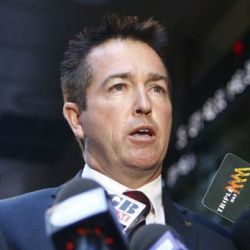New South Wales Pokies Overhaul Seen as Inadequate

Australians are known to enjoy gambling more than most, and in 2016 its punters burned through a whopping $24 billion in cash, of which the majority was lost on the country’s 200,000 slot machines known as pokies. By comparison, the amount gambled at the country’s casinos, racing tracks and Lotto registered as a mere blip on the radar, and according to Tim Costello, spokesman for the Alliance for Gambling Reform:
“Whilst sports betting is top of mind with the advertising deluge.. the latest national figures once again confirm that the pokies are easily the biggest contributor to Australia’s tragic status as the world’s biggest gamblers.”
Over the years, the media has been full of stories highlighting Australia’s growing “pokies epidemic“, and the associated social problems which have spread throughout the country as a result. Against this backdrop, politicians in Victoria, Tasmania, New South Wales, Western Australia, Queensland, and South Australia have devoted a great deal of time debating the topic, and exploring ways in which to reign in the controversial industry.
New South Wales Overhauls Gaming Laws
In March, New South Wales approved a dramatic overhaul of its pokie laws, with news of the far ranging program announced by the Racing Minister Paul Toole (photo). Amongst its key developments is news that 20% of New South Wales will be banned from owning new pokie machines. Furthermore, a weighting system will be used to determine which areas will be allowed to have new slot machines, with particular attention being given to socio-economic considerations in the different regions.
Commenting on this aspect of the new system, and the role data from the Australian Bureau of Statistics (ABS) will play in the process, Mr Toole said:
“In the past socio-economic factors were at 33 per cent weighting, today it is going to be 70 per cent weighting.. It (ABS) looks at the income of those communities, it looks at unemployment — these are the factors that we need to consider when any application is being put forward for additional gaming machines in an area.”
Establishments which rely on revenues from pokie machines obviously risk having a major source of their income cut off by the latest move, as does the state. In order to counteract any negative impact, however, other controversial changes have been introduced that are expected to boost overall revenues from pokie machines by an extra $80 million per year.
Anti-Gambling Groups Unconvinced
These measures include permitting clubs and pubs to lease their pokie machines to other venues, instead of having to forfeit, them which would have been the case under the previous law. According to Greens MP Justin Field, however, this will actually result in the number of pokies located in the state increasing slightly by an additional 1,137 machines within the next couple of years.
Similarly, Reverend Tim Costello, director of the Alliance for Gaming Reform, sees some of the latest reforms doing more harm than good, saying that the new legislation is a disgrace and looked like it had been inked by Clubs NSW. Instead, Costello recommended that the NSW government treated the pokie industry in the same way that it does the tobacco industry. Nevertheless, Mr. Toole has dismissed the criticism leveled against the new legislation, and in a statement explained that the new policies:
“…will be subject to a range of harm minimization requirements, including the Local Impact Assessment scheme, prohibitions on moving machines into high-risk areas and a Responsible Gambling Fund levy. Forfeiture is only one of many harm minimization strategies used to regulate gaming machines in NSW, but will not apply to leasing as it is likely a disincentive to the removal of machines from small pubs and clubs.”
Not convinced, Field and Costello have asked for a parliamentary inquiry to be conducted before the legislation finally passes into law, and have also suggested that the whole process should be delayed until after the 2019 NSW election. The Alliance for Gambling Reform has further recommended that political parties and churches should be banned from operating slot machines, and that a blanket ban should also be placed on political donations from any establishment or body operating pokie machines.
In the meantime, Clubs NSW has voiced its opposition to the proposed parliamentary inquiry, and has insisted that the approved legislation should prove effective in limiting the risks associated with gambling. Clubs NSW represents the interests of more than 1,400 member clubs in the state, and actively lobbies across a range of issues, including alcohol, gambling, and taxation.










